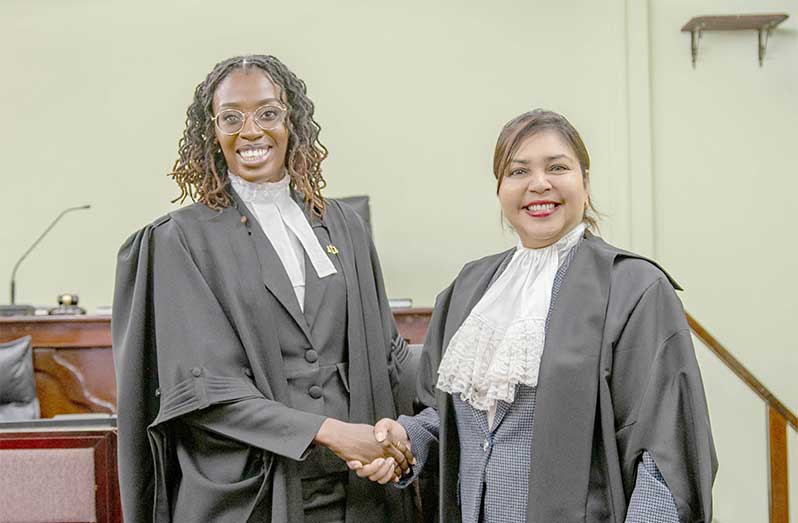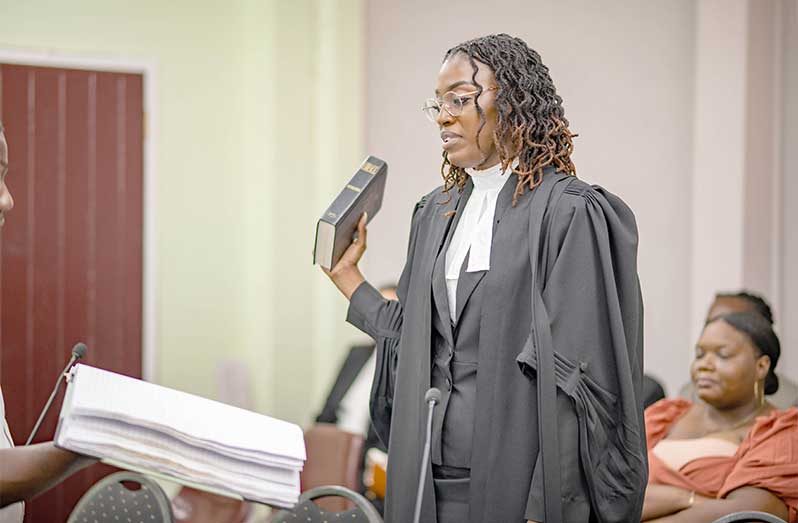THE dream began long before she understood what a subpoena was or why witnesses were sworn in.
As a child, Lucrecia Gray sat captivated by episodes of Judge Judy, her eyes fixed not on the drama of the disputes, but on the woman behind the bench, authoritative, fair, and unflinching in her pursuit of justice.
“I didn’t understand everything then,” Gray recalled, “but I knew people came before the judge with a problem, and the judge’s role was to help solve it based on evidence. That idea — of fairness, of truth — stayed with me.”
On Monday, that early fascination blossomed into fulfilment as Gray was formally admitted to the Bar of the Co-operative Republic of Guyana, granting her the right to practise law in all the courts of the Republic.
The admission ceremony took place before Madame Justice Deborah Kumar-Chetty at the High Court in Georgetown.
Her petition was presented by Attorney-at-Law Leslyn Charles, who praised Gray for her “academic excellence, perseverance, and the promise of lifelong dedication to service.”
A PURPOSE BORN FROM COMPASSION
For Gray, law was never just an academic pursuit — it was a calling rooted in empathy and a sense of justice.
She recalled feeling “uneasy” as a child when she saw others being treated unfairly.

“I didn’t always know what my rights were or if others’ rights were being violated, but I knew when something wasn’t right,” she said. That awareness, combined with a love for learning, would later propel her toward the study of law.
After earning a degree in International Relations from the University of Guyana in 2018, Gray returned to pursue her Bachelor of Laws degree in 2020.
Her studies eventually led her to the Hugh Wooding Law School in Trinidad and Tobago, from which she graduated on October 4, 2025.
FAITH, RESILIENCE, AND A CALLING TO SERVE
Gray described her journey to the Bar as one marked by faith and perseverance.
“There were moments when my passion faded and I questioned whether this path was truly my calling,” she admitted. “But whenever I thought of myself advocating for others — even when it was uncomfortable or unpopular — I felt peace, because I knew I was doing the right thing.”
She views the legal profession not merely as a career, but as a sacred duty. “Being an attorney is more than a profession. It is a gift, a calling to serve with mind, heart, and purpose,” Gray said. “It means standing as a guardian of fairness, ensuring that truth is never silenced by power, and that justice is not reserved for a privileged few.”
Her philosophy is deeply humanistic: “It means seeing people not only through the lens of their circumstances, but through their humanity, extending dignity, compassion, and understanding, even when it is inconvenient to do so.”
WORDS OF GUIDANCE AND WISDOM
In her address, Madame Justice Kumar-Chetty offered both congratulations and counsel, reminding Gray of the three guiding duties that will shape her career: to the court, to her colleagues, and to her clients.
“Your duty to the court is your highest obligation,” the Justice advised. “Your loyalty must always be to the cause of justice and the rule of law. Never mislead the court, suppress the truth, or allow ambition to compromise your integrity.”
She also emphasied the importance of collegial respect in a profession often defined by opposition.
“The legal profession, though adversarial, is a fraternity. Treat your colleagues with courtesy — whether opponents or peers. Never confuse arrogance with confidence, or hostility with strength. True professionalism is measured not by how loudly one argues, but by how well one maintains composure and dignity under pressure.”
Finally, she urged Gray to serve her clients with “competence, diligence, and compassion,” noting that the duty to clients, though listed last, “is by no means the least important.”
A PROMISE FOR THE FUTURE
As she begins her career, Gray carries with her not only academic achievement but also a deep sense of moral purpose. She intends to serve with “integrity, humility, and courage,” recognising that her voice and education are “not ornaments to be worn with pride, but tools to be used with purpose — for the voiceless, the forgotten, and those who stand at the margins of justice.”
With her admission to the Bar, Attorney-at-Law Lucrecia Gray steps into her new role — not merely as an advocate in the courtroom, but as a steadfast guardian of fairness, guided by faith, purpose, and an unwavering belief that justice must always serve humanity.



.jpg)









